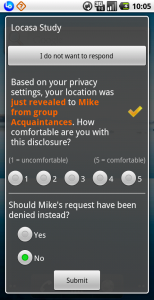Owing to the ever-expanding size of social and professional networks, it is becoming cumbersome for individuals to configure information disclosure settings. We used location sharing systems to unpack the nature of discrepancies between a person’s disclosure settings and contextual choices. We conducted an experience sampling study (N = 35) to examine various factors contributing to such divergence. We found that immediate feedback about disclosures without any ability to control the disclosures evoked feelings of oversharing. Moreover, deviation from specified settings did not always signal privacy violation; it was just as likely that settings prevented information disclosure considered permissible in situ. We suggest making feedback more actionable or delaying it sufficiently to avoid a knee-jerk reaction. Our findings also make the case for proactive techniques for detecting potential mismatches and recommending adjustments to disclosure settings, as well as selective control when sharing location with socially distant recipients and visiting atypical locations.
Our paper will appear at CHI 2014. Read more about our Exposure project.


